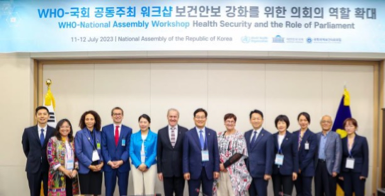
WHO−NATIONAL ASSEMBLY WORKSHOP: HEALTH SECURITY AND THE ROLE OF PARLIAMENT
Western Pacific Region
Republic Of Korea
It is essential to have strong healthcare systems in place to effectively respond to emergencies and maintain crucial health services. The International Health Regulations (IHR, 2005) play a vital role in demonstrating states' commitment to preventing, detecting, and addressing health emergencies. In 2022, the World Health Organization (WHO) and the Inter-Parliamentary Union (IPU) released a handbook for parliamentarians focusing on health security preparedness. This handbook was presented at the Sixth Meeting of the Asia-Pacific Parliamentarian Forum on Global Health (APPFGH) in Seoul, Republic of Korea, in August 2022 and garnered significant interest from APPFGH parliamentarians’ members.
In response to this interest, the WHO Regional Office for the Western Pacific (WPRO) initiated a series of workshops on health security for parliamentarians and their advisors in the region. The workshops aim to enhance parliamentary understanding of the IHR and health security preparedness. Discussions revolve around how parliamentarians and their advisors can support efforts to strengthen health security and establish robust healthcare systems, drawing on lessons learned from the COVID-19 pandemic. Additionally, these workshops explore opportunities for parliamentarians to foster partnerships at both local and national levels and with non-health sector stakeholders to enhance health security systems and capabilities.
WPRO collaborated with the Korean Parliamentarian Forum on Global Health (KPFGH) to organize the first workshop for the National Assembly of the Republic of Korea. This workshop took place on July 11 and 12, 2023, in Seoul, Republic of Korea, with 6 parliamentarians and 16 parliamentary advisors participating in two daily sessions. In the initial session, WHO experts provided updates on global and regional initiatives promoting health security. Discussions included the new pandemic accord, amendments to the IHR (2005), and the Asia Pacific Strategy for Emerging Diseases and Public Health Emergencies (APSED III). The subsequent session featured current and former parliamentarians from Austria, New Zealand, and the Republic of Korea, sharing insights from their experiences in managing various health security crises, especially the COVID-19 pandemic. They elaborated on their roles, the dynamics between parliament and the executive government, collaboration among parliamentary bodies, and pandemic preparedness.